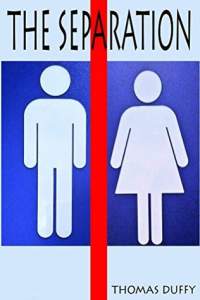
A striking vision of an extraordinarily strange future, The Separation by Thomas Duffy imagines a world where the sexual divide has never been greater – a world where men and women are unaware of the opposite sex, and kept apart for the purpose of social advancement and peace. With a small but dynamic cast of fascinating characters embroiled in this bizarre premise, this novel sings with social commentary, both about present gender conflicts and how those issues may develop in the future.
Finn is a young man who has only recently learned of the existence of the opposite sex, and his perception of the world is understandably turned on its head. However, he isn’t convinced that this is the right path – for him or the human race. Underpinning much of this plot is the idea of personal freedom, and the belief – held by some in power – that people don’t know what’s good for them, and must be directed, corralled and controlled in order to be productive members of society.
This type of totalitarian Big Brother idea is far from rare in literature, but it is executed impeccably well in this book, with just enough slivers of reality for the plot to seem wholly prescient. Touching on issues of governmental overreach in a dystopian future, it is difficult to miss the tongue-in-cheek criticism of political deception (in any era) and the dangers of quiet obedience from the citizenry. On a level beneath the intricate and clever plot, however, this novel presents poignant philosophical musings on the role of gender in our lives, and how males and females are not contradictory, but rather perfectly complementary to the other.
Though the story and its message are dead on, there are pacing issues, as some of the information dumps seem convenient and easy, whereas this world could have been more slowly explored and revealed. The dialogue seems stiff at times as well, which does detract from the book’s overall realism. Furthermore, given the serious subject matter that is being discussed, in a world where such things are not discussed, some of the characters seem too precocious to be believed. They help to progress the plot, as well as flesh out the argument and message of the book, but some of the conversations seem deliberately placed and worded, instead of developing organically from the characters readers have come to know.
That being said, the unpredictable flow of the plot, as well as the keynote figure of Finn, carries this book past these issues. The attention to detail is impressive, with many of the possible loopholes to such an unconventional story closed before they become glaring errors. The novel could have been wholly unbelievable, but Duffy isn’t afraid to pursue these bold ideas to their singularity, making the novel difficult to put down.
Overall, The Separation is flawed in parts of its execution, but the storyline is so intriguing, with so many potential implications for the characters – and for the real world – that the novel will stick with you long after the final page.
Book Links
STAR RATING
Design
Content
Editing
Get an Editorial Review | Get Amazon Sales & Reviews | Get Edited | Publish Your Book | Enter the SPR Book Awards | Other Marketing Services























Leave A Comment